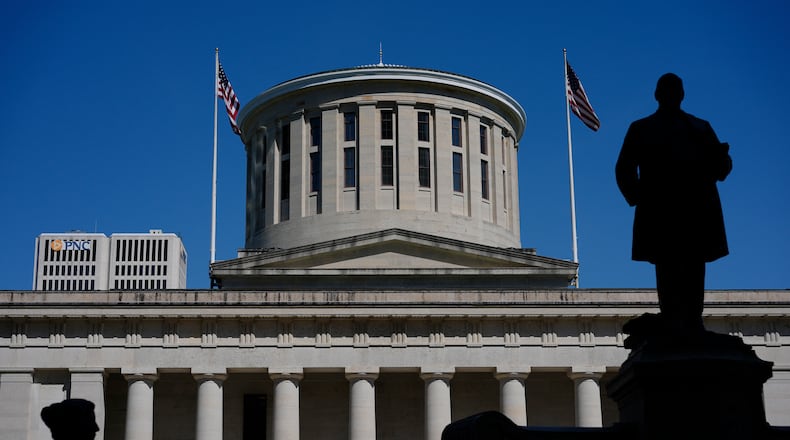During the sixth hearing on the bill Wednesday, Paul Imhoff, director of governmental relations for the Buckeye Association of School Administrators, said they support the original version of the bill but the amendment would be a disaster, “We fear that this new proposal will mean that the children who need us the most will lose the most.”
“Behind these numbers are the students of Ohio. The revenue at stake represents teachers in the classroom, bus drivers, counselors, and more. These resources have already been promised, appropriated, and collectively bargained,” he said. “Retroactively stripping these resources away will hit hardest for those in our poor and rural schools who can least afford such a change.”
Co-sponsor of the bill former Ashtabula County auditor Rep. David Thomas has said the committee essentially took a “time machine” approach, going back to 2022 — when property values ballooned and many tax bills subsequently exploded — and compared property value increases to inflation rates. The difference between the two numbers, Thomas explained, determined the credit amount that the amended HB 186 would provide to property owners who have been paying property tax bills based on property values that dramatically spiked. This strategy effectively provides a future tax credit for previous amounts paid in excess of the rate of inflation.
He said they are applying the modification statewide in school districts that are at the 20-mill floor, where value increases produced huge tax windfalls throughout the mandated property reappraisal schedule over the past few years, “the (modification) allows us to give a direct credit and decrease to all those properties. We wanted to treat everyone at the same time and fairly.”
Ohio law says once a school district’s total current expense millage is reduced to 20 mills, it cannot be reduced any further, so tax revenues grow as property values increase.
As to the matter of retroactivity Imhoff mentioned — retroactive laws are prohibited — Thomas told this news outlet it is not technically true that the credit is retroactive.
“It’s not retroactive in the sense that it just says if we had passed that bill in 2022, what would be the difference moving forward in 2026,” he said. “You can’t essentially penalize back but you can change forward. It’s a little bit of semantics but it’s actually a huge difference in constitutional questions.”
Following the 2023 value update, property values jumped an average 37% in Butler County, 34% in Montgomery County and 30% in Greene County. Taxes didn’t rise quite so high but early estimates in Butler County showed all the taxing units combined would realize a $78 million “windfall” from the value boom.
Clark County is going through the sexennial reappraisal process and values are expected to jump 32% on average.
The 20-mill floor factor impacted taxpayers in Butler heavily, of the 10 school districts only Fairfield and Lakota weren’t at the floor. Every district in Clark is at the floor. In Greene County, Bellbrook Sugarcreek Local School District is the only district that hadn’t hit the 20-mill floor. The Miamisburg School District is the only Montgomery County district at the floor.
According to the Legislative Service Commission fiscal report, the tax credits would total $440 million next year, $616 million in 2027 and $642 million the year after that.
A spreadsheet compiled by LSC and provided to this news outlet by BASA shows seven districts in Butler County would lose about $10.8 million in revenue next year, six of seven Greene County districts would lose nearly $8.3 million and three of 16 Montgomery County districts would be out $2.1 million, based on the formula in amended HB 186. Since Clark County is on a different reevaluation schedule their credits won’t kick in yet.
During the committee meeting Rep. Gary Click, R- Vickery told a story about when he was younger and a bank teller gave him $300 extra and he returned it.
“I returned that money because it was not supposed to be mine,” he said. “And I think that is a parallel to what is happening here. I think there was a sudden increase that was not intended by the voters, it was not supposed to happen. It was due to those sudden spikes in property values and I think the right thing to do is give that back to the people it belongs to.”
Click asked Imhoff to explain why that shouldn’t occur with these excess dollars.
“It was not a mistake that these districts have received those funds,” Imhoff replied. “That was and is the law of the state of Ohio at the time.”
He added that he looks at these windfalls, which he said went mainly to rural, poorer districts, as an “economic development issue” for the state, “we have used those funds to invest in things that are going to make a long-lasting difference in the lives of these kids.”
He said it will be very hard for districts to “pull back” and there will likely be layoffs. This news outlet asked Imhoff if there were any implications in schools keeping windfalls in areas where taxpayers could not afford to pay the hefty tax bills.
Imhoff said recent studies have shown “a historic tax shift” of the burden onto the shoulders of property taxpayers and the state has abdicated some of its responsibility. The only way to give taxpayers relief he said is “by the state coming in as a partner, it’s going to take the state and local government including schools working together.”
Republican leadership has repeatedly said they are not going to spend any more state dollars to give property taxpayers relief. Nearly all of the pending tax reform measures like HB 186 place the onus for lowering taxes on local governments and schools.
The bill will have a seventh hearing on Wednesday, the agenda indicates there could be another amendment. Thomas told this media outlet the Democrats might submit something but he won’t.
About the Author
